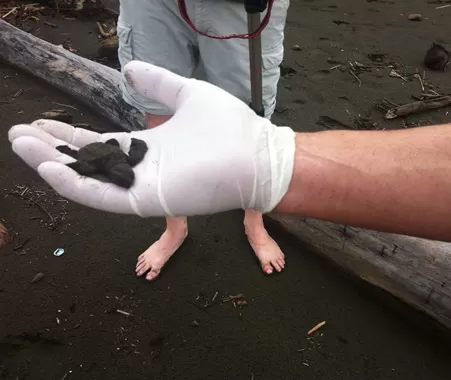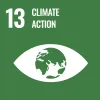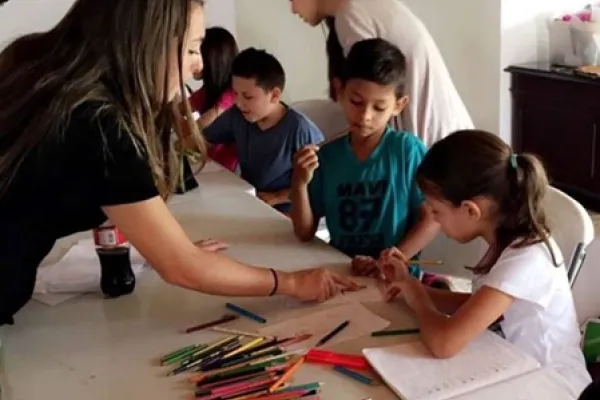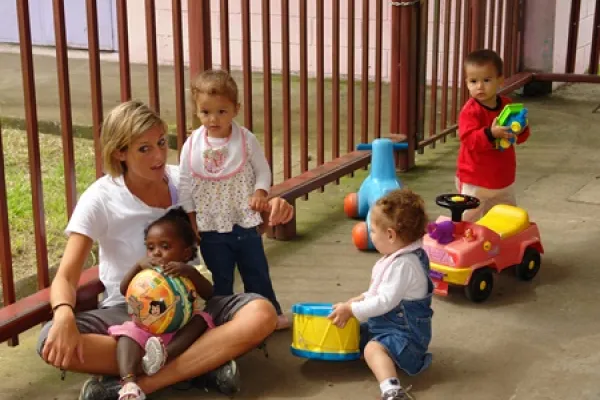Overview
Als vrijwilliger voor het Turtle & Sloth Conservation Program in Costa Rica werk je samen met de lokale medewerkers die al bezig zijn met het redden van de levens van deze dieren. De afgelopen jaren is het aantal schildpadden enorm afgenomen en nu staan ze op de lijst van bedreigde diersoorten. Als we nu niet in actie komen, kunnen we deze dieren voorgoed verliezen.
Dit ongelooflijke project ligt op een afstand van ongeveer 30 minuten ten zuiden van het kleine stadje Quepos aan de centrale Pacifische kustlijn van Costa Rica, ongeveer 1 uur ten zuiden van Playa Hermosa en Playa Jaco en 2,5 uur van San Jose. Met een relatief afgelegen uitgestrekt strand, grotendeels onbesmet door geluid en licht, is dit een populaire broedplaats voor duizenden zeeschildpadden per jaar. De meest voorkomende soorten zijn Olive Ridley, Pacific Green, Leatherback en Hawksbill.
Vrijwilligers zullen de schildpaddeneieren beschermen en verzorgen die tijdens het broedseizoen - van augustus tot februari - over het strand worden gelegd. Daarnaast zullen vrijwilligers het onderzoeks- en beschermingswerk ondersteunen, wat inhoudt dat ze schildpadden tellen, nesten opmeten, wetenschappelijke informatie verzamelen en 's nachts patrouilleren op het strand. Ze zullen ook helpen bij het beschermen van schildpaddennesten tegen menselijke stropers, assisteren bij de eieroogstprogramma's en helpen in de kwekerijen. Vrijwilligers krijgen misschien ook de fantastische kans om deel te nemen aan de daaropvolgende vrijlating van de schildpadden in de zee!
Daarnaast zullen vrijwilligers ook de lokale luiaardpopulaties in de gaten houden om deze soort te beschermen en te behouden. Het spreekt voor zich dat dit een geweldige kans is om unieke ervaring op te doen met beschermingsprojecten, meer te leren over de Costa Ricaanse bevolking en cultuur en naar prachtige locaties te reizen.
Vrijwilligerswerkrooster
Vrijwilligerswerkrooster
Vrijwilligers moeten een vlucht naar San Jose nemen, vanwaar ze naar een gastgezin in Santa Barbara de Heredia worden gebracht, 40 minuten ten noorden van San Jose. (Aankomst is op zaterdag)
Op zondag regelt het lokale team dat u wordt opgehaald bij uw gastgezin en per openbare bus naar de projectlocatie wordt gebracht. Een vertegenwoordiger van het lokale projectteam zal u bij aankomst op het busstation ontmoeten en u naar de accommodatie brengen om u te settelen.
Maandag: U wordt naar de projectlocatie gebracht en voorgesteld aan de projectleider. Hij/zij geeft u specifieke informatie over uw rol.
Vrijwilligers moeten flexibel zijn om in dit programma te werken, aangezien de schema's grotendeels afhankelijk zijn van het seizoen en de fokactiviteiten die plaatsvinden. Een algemene dag zou er echter ongeveer zo uitzien:
04:30 uur - Strandpatrouille
Dit is een activiteit die het hele jaar door kan worden gedaan, zelfs in het laagseizoen (maart tot juli). Vrijwilligers moeten 's ochtends vroeg op patrouille gaan over het strand om de broedplaatsen van schildpadden te bewaken en te beschermen.
08:00 uur - Ontbijt bij de accommodatie
Vrijwilligers zijn na het ontbijt meestal vrij en kunnen hun tijd besteden aan lezen, de omgeving verkennen, zwemmen of relaxen op het strand.
13:00 uur - Lunch in de accommodatie
Vrijwilligerswerk in de middag Na de lunch krijgen vrijwilligers verschillende taken toegewezen die meestal variëren afhankelijk van het seizoen. Meestal kunnen vrijwilligers verwachten dat ze elke doordeweekse middag 2 - 3 uur werken om taken uit te voeren om zeeschildpadden en wilde dieren (zoals luiaards, papegaaien, ara's, alligators en meer) in de lokale omgeving te monitoren, te behouden en te verzorgen.
Avonden/nachten Vrije tijd/nachtpatrouilles
Tijdens de broedperiode (van augustus tot en met februari) worden vrijwilligers ingezet bij nachtelijke strandpatrouilles om de schildpadden te beschermen, eieren te verzamelen en de broedgebieden in het algemeen te bewaken.
Vrijwilligersrol en verantwoordelijkheden
Vrijwilligersrol en verantwoordelijkheden
Als vrijwilliger voor het natuurbehoudprogramma in Costa Rica zijn uw belangrijkste taken:
Strand schoonmaken, nachtelijke patrouilles, toezicht op de schildpaddeneieren
Het voorbereiden en onderhouden van de schildpaddenkwekerijen
Ondersteun het lokale personeel en werk aan projecten om de omgeving voor nesten te verbeteren en de reis van de pasgeboren zeeschildpadden naar de Stille Oceaan veiliger te maken.
Herbebossingsactiviteiten en behoud van de natuurlijke leefomgeving van de luiaards
Voorlichting aan de lokale bevolking over de handel in schildpadden en de gevolgen daarvan
Project Requirement
Project Requirement
Vrijwilligers moeten 18 jaar of ouder zijn op het moment dat ze zich bij het project aansluiten. Je moet een open geest en een flexibele houding hebben om in een nieuwe en andere omgeving te werken. De vrijwilliger moet energie en enthousiasme meebrengen om een verschil te maken. Deelnemers moeten fit en gezond zijn op het moment dat ze zich bij het programma aansluiten en moeten bereid zijn om buiten te werken en hun handen vuil te maken. Deelnemers aan het programma moeten een grote interesse en liefde hebben voor dierenbeschermingswerk. Deelnemers mogen geen strafrechtelijke veroordelingen hebben en moeten een schoon strafbladrapport overleggen.
Schedule a Google Meet with a Program Advisor
Interested in our programs? We're here to provide expert guidance
- Get Detailed Info
- 20 min One -on-One meeting
- Get expert advise
- Application Guidance
Photo Gallery
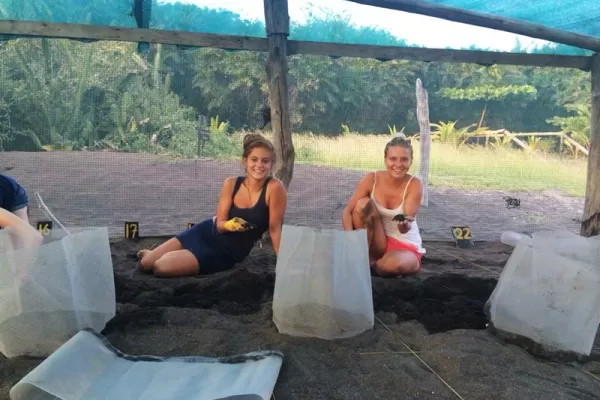
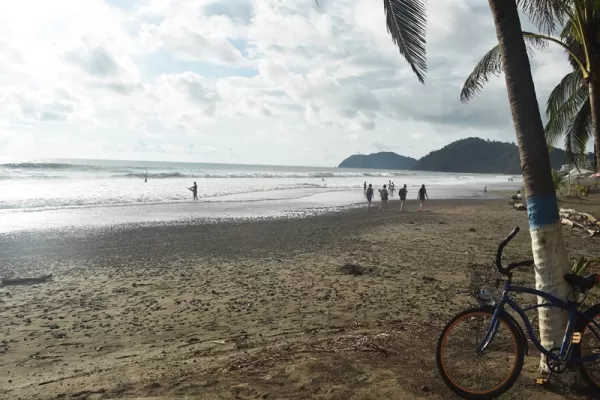

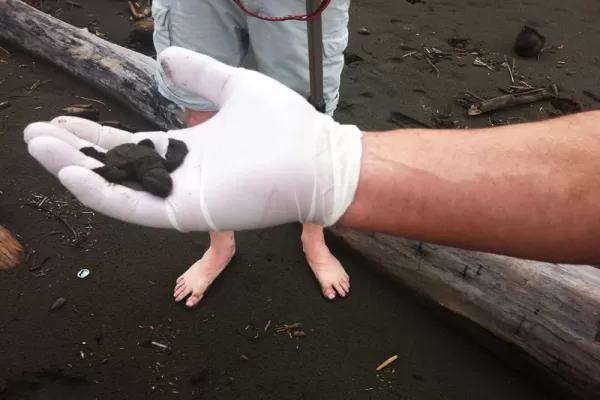

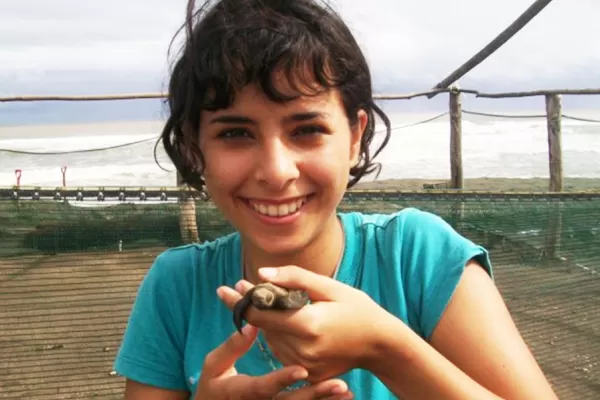
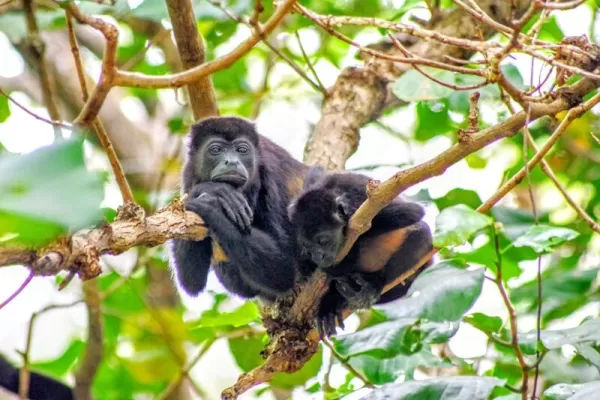
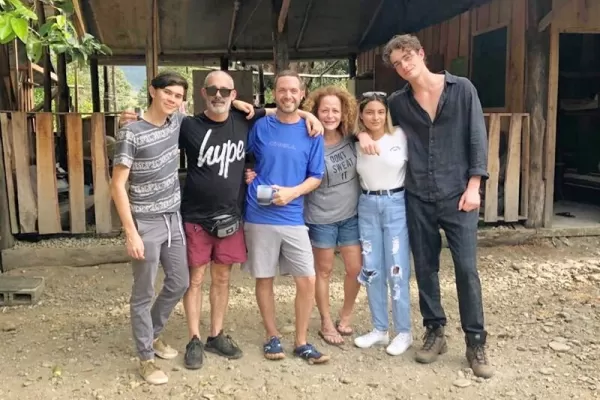
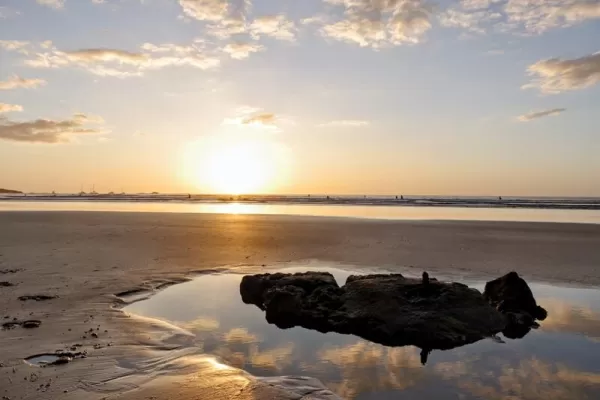
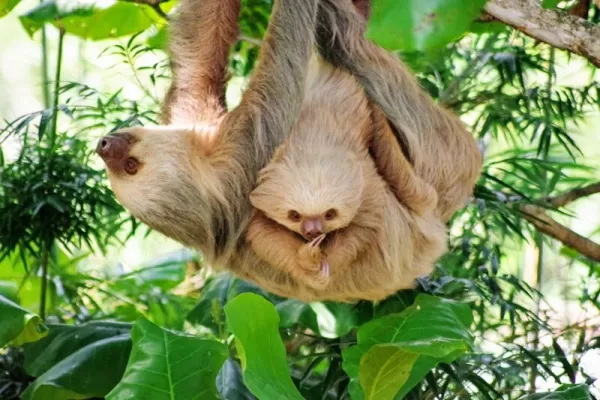
Living
Living
Luchthaventransfer
Vrijwilligers worden door de lokale coördinator of vertegenwoordiger opgehaald op de internationale luchthaven van San Jose en naar de accommodatie van het gastgezin in Santa Barbara de Heredia gebracht voor de eerste nacht.
Accommodatie
Bij aankomst in Costa Rica wordt er een nacht in een gastgezin gehuisvest. Op de projectlocatie verblijven deelnemers in het vrijwilligershuis in Matapalo, waar de kamers slaapzalen zijn die gedeeld worden door vier vrijwilligers. Het huis heeft alle basisvoorzieningen, waaronder westerse badkamers, elektriciteit, douches met koud water, wifi, gemeenschappelijke ruimtes en een goed uitgeruste keuken. Beddengoed is aanwezig, dus vrijwilligers hoeven alleen toiletartikelen en een handdoek mee te nemen.
Oriëntatie
Alle vrijwilligers krijgen een oriëntatie vanaf de startdatum van hun project. De oriëntatie wordt uitgevoerd door het lokale personeel van het project en omvat onderwerpen zoals Projectoverzicht, Regels en verwachtingen, Veiligheid en Introductie tot uw project en plaatsing.
Maaltijden
Bij het gastgezin worden twee maaltijden per dag verzorgd. Tijdens het project worden ontbijt en lunch dagelijks verzorgd in het programma. Diner kan ook worden geregeld met de projectlocatie voor een kleine vergoeding of vrijwilligers kunnen samen met andere deelnemers uit eten gaan in de omgeving.
Tijdens je vrije tijd
Vrijwilligers mogen in hun vrije tijd of weekenden plekken bezoeken en bekijken. Het land biedt ongeëvenaarde natuurlijke schoonheid, actieve vulkanen, regenwouden en een breed scala aan nationale parken en ecotoerisme. Daarnaast heeft Costa Rica meer dan 1.000 mijl aan prachtige witte en zwarte zandstranden.
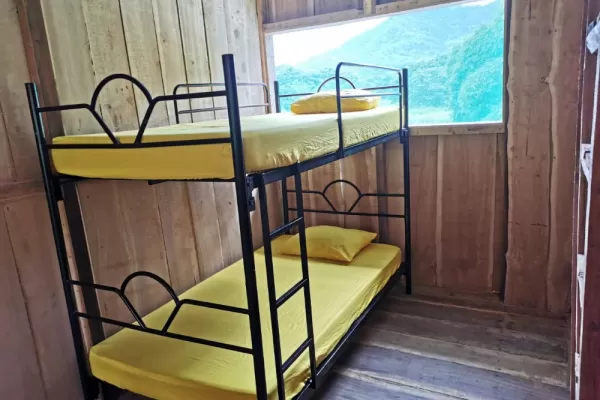
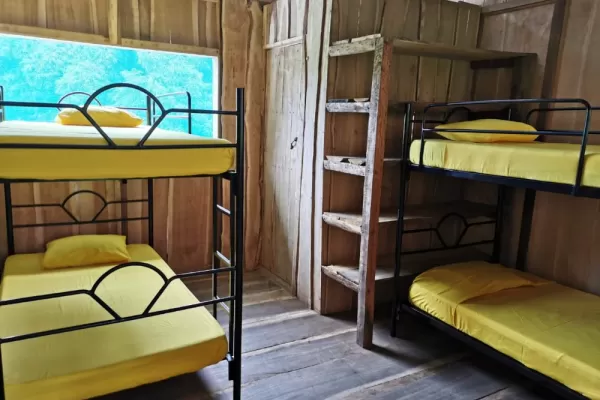
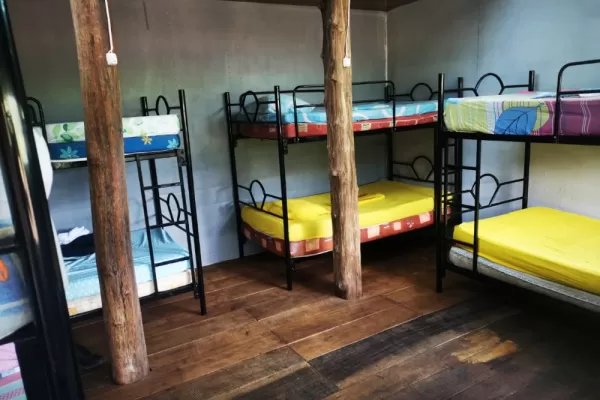
Dates
Dates
januari
12
26
februari
02
16
maart
02
16
30
april
06
20
mei
04
18
juni
01
15
juli
06
20
augustus
03
17
september
07
21
oktober
05
19
november
02
16
december
07
21
Available
Filling Fast
Booked Out
Costs
| Duration |
Program Fee
|
Choose your currency
|
|---|---|---|
| 1 Week | $699 | |
| 2 Weeks | $1131 | |
| 3 Weeks | $1625 | |
| 4 Weeks | $2055 | |
| 5 Weeks | $2455 | |
| 6 Weeks | $2855 | |
| 7 Weeks | $3255 | |
| 8 Weeks | $3655 | |
| Extra Week | $420 |
Please Note: An application fee of is charged over and above the program fee as an application payment. A 5% international banking fee is charged for credit card payments of program fee in USD/AUD.
Waar betaalt u voor?
- 24 uur per dag assistentie en ondersteuning van VS-personeel
- Uitgebreide informatie vóór vertrek
- Ophalen van de internationale luchthaven van San Jose en transfer naar de accommodatie
- Busvervoer naar Playa Matapolo en ophalen bij het busstation
- Oriëntatie bij aankomst op Project
- Accommodatie in slaapzaalstijl op het project
- Maaltijden
- Certificaat van deelname (op aanvraag)
Wat is NIET inbegrepen?
- Vliegticket
- Visa
- Vaccinaties
- Weekendtrips en excursies
- Alle persoonlijke uitgaven
- Reisverzekering (beschikbaar tegen nominale kosten)
- Post-projectverblijf in San Jose
- Terugreis naar San Jose
FAQ's
Application and Program Details
-
Are there any necessary requirements to participate in the Costa Rica volunteer programs?
-
Below are the necessary requirements to participate in the Costa Rica volunteer projects:
Volunteers must be 17 years or older for Teaching, Childcare, and Spanish Immersion at the beginning of the program. For all other programs, you need to be 18 years or older.
Volunteers joining the medical volunteer project must be either Pre-Medical, Medical or Nursing student or possess other qualifications related to medical and nursing field. Medical professionals such as doctors and nurses are also welcome to join the program.
Volunteers need to have an open mind and flexible attitude for working in a new and different environment.
The volunteer should bring energy and enthusiasm to make a difference.
The participant must be in good health.
Knowledge of Spanish (basic to intermediate) is necessary for all the programs. -
When do I need to arrive in Costa Rica for my program? What will happen once I arrive in Costa Rica?
-
All volunteers have to arrive one day before their program start date. You can view your arrival dates here. Volunteers are picked up from the Juan Santamaria Airport by the local coordinator or representative and taken to the respective host family accommodations. On the next day, i.e. Monday, there will be an orientation session which will cover the program highlights and provide you details about the city. You will get to know about the local culture, marketplaces, ATMs, internet cafes and where to shop for your daily essentials. On Monday, volunteers would also be required to take a Spanish test to assess their Spanish knowledge.
To add to the project experience, you can also join the Spanish Immersion Week which gives you a crash course in Spanish and even tests your current Spanish skills which would help you in volunteering, and you would also get a chance to experience Costa Rican culture, learn cooking and Latino dancing before beginning the program.
Note: Host accommodation is located in suburbs of San Jose in the Heredia and Santa Barbara areas, along with your projects placements. -
Can I volunteer as part of a group?
-
Yes, you are welcome to take part in Costa Rica Volunteer Programs as part of a group. We welcome families, friends, high school students, college/university and corporate groups to volunteer together in the Costa Rica volunteer programs.
-
What are the Program locations in Costa Rica?
-
The Childcare, Teaching and the Medical Healthcare projects are located near San Jose, primarily in the areas of Heredia and Santa Barbara.
The Turtle Conservation project is located in both Pacific and the Caribbean coasts.The Wildlife and Animal Rescue Center is located 4km away from Puerto Viejo and 220km from San Jose, Costa Rica’s capital.
-
When should I apply for the volunteer programs in Costa Rica?
-
It is advised to apply for the projects once the volunteering/ traveling dates are decided as there are limited spots available. The application fee is valid for one full year and can be sent earlier than the desired period of volunteering, for timely confirmation of the seat. As soon as you decide the travel dates, we suggest you to apply for the program and hold your spot. We abide by the first come first serve policy.
-
I haven’t traveled or volunteered abroad before. Can I still be a part of VolSol?
-
Yes, most definitely you can, as we believe that every participant brings something new to the project. If you do not have previous experience, we offer you the opportunity to have a great start with us. We make international volunteering easy – not only are our Volunteer Abroad opportunities rooted in offering you extensive support, but they are also very affordable.
-
How long will it take to process my application? Will my application be accepted?
-
Usually, it takes around 10-12 working days for the application to be processed and placement to be confirmed. After we review your CV and documents, your booking is confirmed and the booking confirmation is updated in your My Account and you can view the information in your account. The application acceptance depends on the availability of seats in the project as well as the eligibility criteria of the program (age, skills and experience etc.).
-
Does VolSol provide with a reference or a certificate after program completion?
-
Yes, we will provide you with the Certificate after successful completion of your program. The certificate is provided on request.
Health and Safety
-
How safe is Costa Rica in general?
-
Costa Rica is a tourist friendly and safe destination. Volunteering Solutions is very particular about the safety of its international volunteers. We have stringent selection criteria for host family accommodation. You will be given safety precautions and instructions by the local coordinator team during the orientation as well as in your Pre-departure handbook after you become an enrolled participant. Apart from that, we advise volunteers to consult their in-country coordinators before embarking on a weekend trip or going on a night out.
-
Do I need to buy health insurance?
-
Yes, for all participants, it is mandatory to have a valid travel medical insurance for their trip. Volunteers have the option to purchase Travel and Medical Insurance at a nominal extra cost from Volunteering Solutions. To provide the best option to our participants, we offer comprehensive insurance coverage in collaboration with a leading insurance provider.
If you already have a valid Travel and Medical insurance, you can email us a copy of the same. It is also advised to bring along the Insurance documents during your trip. -
What immunizations/vaccinations will I need?
-
All participants are recommended to consult their physician or travel doctor before traveling to Costa Rica. To view the general list of vaccinations recommended for your travel to Costa Rica, click">https://wwwnc.cdc.gov/travel/destinations/traveler/none/costa-rica">cli… here.
Accommodation and Living
-
Would I have free time during my program? Can I do sightseeing during my program?
-
Depending on your project placement, you will get evenings and the weekends free to travel and explore the place. In the evenings, volunteers usually get together and go out for social gatherings, eat out or just relax at the volunteer house. Weekends are free for the volunteers and you can go for short weekend trips. There’s actually so much to do in Costa Rica. Visit Nicoya Peninsula, Arenal Volcano, Corcovado National Park, Monteverde Cloud Forest Biological Reserve, La Paz Waterfall Gardens, Tabacón Hot Springs, San José, Caño Negro Wildlife Refuge, Tortuguero National Park and much more.
The local coordinators will be happy to help you with more information. -
Are there more expenses once I arrive in Costa Rica?
-
Your program fee does not cover your personal expenses. You will need to provide for yourself your personal expenses, such as bottled water, local transport, telephone, shopping, sightseeing etc. However, you should carry around $70-$80 per week for your basic personal expenses. This amount can vary and you would need a higher amount if you choose to go on weekend trips out of town.
-
Can I know more about accommodation and food arrangements?
-
Volunteers working in Turtle Conservation Project stay in ranger house, host family or volunteer house accommodations close to the project near the beach. Dorm-style accommodation is provided where you will be sharing rooms with other volunteers (same gender basis). Upon arrival in Costa Rica, volunteers are provided lodging in a host family accommodation in Heredia or Santa Barbara. After completing the orientation and project introduction on the first days, volunteers join their respective Turtle Conservation Project in either Pacific or Caribbean Coast.
For all other projects, volunteers will be staying with host families. More details about the host families would be provided after you apply for the program. Volunteers would be provided meals 2 times a day.
Volunteers working in the animal rescue center project in Puerto Viejo are provided accommodation in a hostel in San Jose on arrival. While at the project volunteers stay at a dorm style hostel accommodation. Meals are not included but volunteers cook their own meals at a fully equipped kitchen. -
What if I have my own accommodation. Can I still volunteer for the project?
-
Unfortunately, the entire volunteering experience is as much about volunteering on your project, as it is about the cross-cultural exchange and community building. A lot of that happens through the accommodation that we have set up, where one can enjoy by being with like-minded people. Additionally, for safety reasons, all volunteers must live in the allotted accommodation.
-
For how many hours do I have to volunteer in a day?
-
Volunteers usually work for 4 to 6 hours a day depending on their program. You will have weekends off so you can travel on weekends. However, volunteers need to be flexible, open-minded and understand that work requirements can change as well on certain occasions.
-
Can vegetarians be accommodated?
-
Yes, however, you must inform us in advance and also mention about any dietary requirement in your application form.
-
Where can I change my money in Costa Rica? Are there ATMs in the city?
-
You can change money upon your arrival at Juan Santamaria Airport or from the bank. There is a good network of ATMs as well.
Connect with Past Volunteers
-
How can I connect with past Volunteering Solutions Costa Rica alumni as well as other former and current volunteers?
-
We encourage volunteers to get in touch with former Volunteering Solutions Costa Rica program participants and also other program participants joining our projects. You are recommended to join the Volunteering">https://www.facebook.com/VolunteeringSolutions/">Volunteering Solutions Facebook Page or Facebook">https://www.facebook.com/groups/VolunteeringSolutions/">Facebook Group to communicate with other participants.
To read alumni interviews from past participants, visit ?the Meet">https://www.volunteeringsolutions.com/meet-a-volunteer">Meet a Volunteer section on our website.
Flights and Visa
-
Does Volunteering Solutions help with Visa?
-
Participants (most nationalities) require a Tourist Visa to travel to Costa Rica. Travelers from most countries can get a 90-day permit stamped on their passport on arrival.We advise you to check with your nearest Costa Rican embassy as well.
-
What are the recommended airlines to fly to Costa Rica?
-
Juan Santamaría International Airport is well connected with direct flights coming in from different destinations in the US and South America. For volunteers coming from North America, following Airlines are recommended:
US Airways
Delta
For those flying in from Europe, direct flights are available, and the recommended airlines are:
Condor
Iberia


























